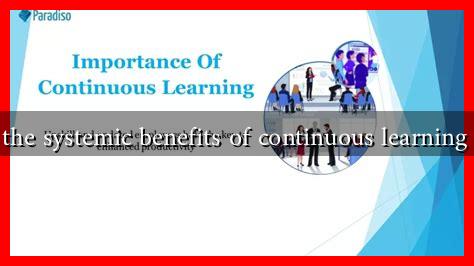-
Table of Contents
What are the Systemic Benefits of Continuous Learning in Society
In an ever-evolving world, the concept of continuous learning has emerged as a cornerstone for personal and societal development. Continuous learning refers to the ongoing, voluntary, and self-motivated pursuit of knowledge for personal or professional development. This article explores the systemic benefits of continuous learning in society, highlighting its impact on economic growth, social cohesion, and individual well-being.
The Economic Impact of Continuous Learning
Continuous learning plays a pivotal role in driving economic growth. As industries evolve and new technologies emerge, a workforce that is committed to lifelong learning is essential for maintaining competitiveness. Here are some key economic benefits:
- Increased Productivity: A skilled workforce is more productive. According to a report by the World Economic Forum, companies that invest in employee training see a 24% increase in productivity.
- Innovation and Adaptability: Continuous learning fosters a culture of innovation. Employees who engage in ongoing education are more likely to contribute creative solutions and adapt to changes in the market.
- Reduced Unemployment Rates: A well-educated workforce can reduce unemployment rates. The OECD reports that countries with higher levels of adult education have lower unemployment rates.
For instance, companies like Google and Amazon have implemented continuous learning programs that not only enhance employee skills but also drive innovation, resulting in significant market advantages.
Social Cohesion and Community Development
Beyond economic benefits, continuous learning contributes to social cohesion and community development. A society that values education fosters inclusivity and collaboration. Here are some ways continuous learning enhances social structures:
- Empowerment: Continuous learning empowers individuals, particularly marginalized groups, by providing them with the skills needed to participate fully in society.
- Stronger Communities: Educational programs that promote lifelong learning can strengthen community ties. For example, community colleges often serve as hubs for adult education, bringing people together and fostering a sense of belonging.
- Reduction of Inequality: Access to continuous learning opportunities can help bridge the gap between different socio-economic groups, promoting equality and social justice.
Case studies from various community initiatives, such as the “Learning Cities” movement endorsed by UNESCO, illustrate how continuous learning can transform communities by enhancing local skills and fostering civic engagement.
Individual Well-Being and Personal Growth
On a personal level, continuous learning significantly contributes to individual well-being and personal growth. Engaging in lifelong learning can lead to:
- Enhanced Mental Health: Studies have shown that learning new skills can improve mental health by reducing stress and anxiety levels.
- Increased Job Satisfaction: Employees who pursue continuous learning often report higher job satisfaction and engagement, leading to lower turnover rates.
- Personal Fulfillment: Learning new things can provide a sense of accomplishment and purpose, contributing to overall life satisfaction.
For example, a survey conducted by LinkedIn Learning found that 94% of employees would stay at a company longer if it invested in their career development, highlighting the importance of continuous learning for job retention and satisfaction.
Conclusion: The Path Forward
In conclusion, the systemic benefits of continuous learning in society are profound and multifaceted. From driving economic growth and fostering social cohesion to enhancing individual well-being, the advantages are clear. As we navigate the complexities of the modern world, embracing a culture of continuous learning is not just beneficial; it is essential for sustainable development. By investing in education and lifelong learning initiatives, societies can create a more skilled, adaptable, and cohesive populace, ultimately leading to a brighter future for all.
For more insights on the importance of continuous learning, you can explore resources from the World Bank and the OECD.


